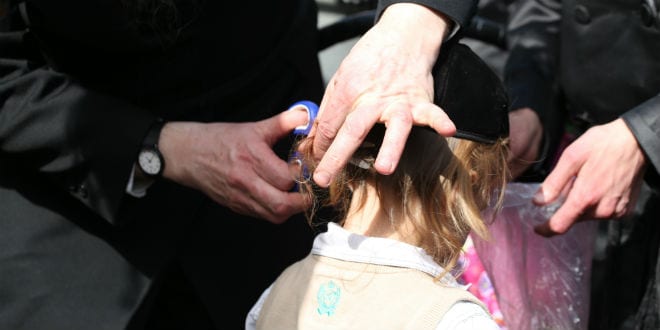American fashion designer to the celebrities, businesswoman, and writer Rachel Zoe Rosenzweig, better known as Rachel Zoe from her Bravo reality television series “The Rachel Zoe Project”, might have just set a new fashion trend, the chalaka (Hebrew חלאקה). A chalaka or upsherin in Yiddish (אפשערן), is a haircutting ceremony held when a Jewish boy turns three-years-old and receives his first haircut. The event is generally observed by a cross-section of Jews, usually who align with Orthodox traditions. Zoe’s public performance of this ritual put the Internet on fire.
“Cutting a boys hair at this age makes a strong emotional impression as he has enough understanding to recognize that he is advancing to a new stage in life and moving into a new role,” explained Roni Segal, academic adviser for The Israel Institute of Biblical Studies, a company which offers courses on Bible and and Biblical languages, to Breaking Israel News. “At the chalaka, the boy’s hair is cut, he is given his first pair of tzitzit [fringed four-cornered ritual garment] and yarmulke, makes a prayer and begins learning the Hebrew alphabet. In fact, it is customary to place honey on the Hebrew letters as he learns them in order to make the study of Hebrew sweet.”
Though the chalaka ritual has only been in practice since the 17th century, it is based on the Biblical precept that man is compared to a tree whose fruits may only be enjoyed after its third year.
“When ye shall come into the land, and shall have planted all manner of trees for food, then ye shall count the fruit thereof as uncircumcised: three years shall it be as uncircumcised unto you.” (Leviticus 19:23)
Applying this principle to cutting a child’s hair at the age of three, it is hoped that the child, like a tree, will produce good things in his lifetime, will grow in knowledge and will someday have a fruitful family of his own.
It is noteworthy that Zoe dropped her family name, Rosenzweig, in favor of her middle name when she began her career, claiming that Rosenzweig sounded “too Jewish”. Yet, she proudly posted on her Instagram account, which has over 2.6 million followers, pictures of her 3-year-old son Kaius Jagger celebrating his chalaka with the hashtag, “#thisis3”.
A post shared by Rachel Zoe (@rachelzoe) on
Zoe faced continuous criticism for allowing her son to “look like a girl” because of his long locks. Yet, one user explained, “There is a holy custom not to cut a boys hair until he’s three and it signifies great strength,” referring to the Jewish custom.
Though Kaius’s haircut was done by celebrity hairstylist Joey Maalouf, with Zoe captioning the Instagram picture stating, “Big night tonight…huge,” it is more customary to have rabbis, Bible scholars, family members and friends each take turns cutting a lock of hair.
“The chalaka is also a way to have the child’s payot (פֵּאוֹת) or side locks emphasized, as, while the rest of his hair is cut short, the child’s side locks are left intact as a glorification of the Biblical commandment in Leviticus 19:27, “Ye shall not round the corners of your heads,” continued Segal. “It is also customary for the child to connect to the Hebrew language by teaching him to sing a Hebrew song based on the Biblical verse in Deuteronomy 33:4, תּוֹרָה צִוָּה לָנוּ מֹשֶׁה מוֹרָשָׁה קְהִלַּת יַעֲקֹב, (Torah tzivah lanu Moshe, morashah kehilat Yaakov), Moshe commanded us a law, an inheritance of the congregation of Yaakov.”
Since the chalaka marks the transition when a young boy moves from being a taker towards greater performance of Biblical commandments, other common traditions at the event include weighing the cut-off hair and donating that value in gold to charity or, if the hair is long enough, donating it to make wigs for cancer patients.
As a fashion stylist to such big names as Nicole Richie, Jennifer Garner, Kate Hudson, and Jennifer Lawrence and publisher of the book, “Living in Style: Inspiration and Advice for Everyday Glamour”, it will be interesting to see if Zoe’s daring public display of an unusual yet meaningful Jewish tradition catches on.
To learn more about the Bible and Hebrew, please visit here.




